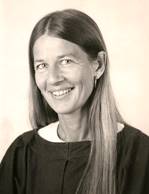Recent news
Obituary in Memory of Dr. Elisabet Helsing

Elisabet Helsing, born in Oslo in 1940, began her working life as a school teacher. It was while nursing her own two children that she developed a strong interest in protecting, promoting and supporting breastfeeding. Backed by a young medical officer in the Norwegian National Directorate of Health, Gro Harlem Brundtland –later Norway’s Prime Minister and Director-General of the World Health Organization (WHO) ‒she developed official pamphlets with practical advice for mothers on how to succeed at breastfeeding. In 1968, she founded Ammehjelpen, the mother-to-mother breastfeeding support group, which rapidly expanded across the country and was credited with the dramatic rise in breastfeeding in Norway over the subsequent decade. In 1969, she enrolled in nutrition studies at the University of Oslo to bolster her scientific credentials and lend weight to her campaign for breastfeeding. Her interests grew to nutrition policy more broadly, something later reflected in her doctorate from the University of Athens in 1989 where she compared the evolving national nutrition policy in Norway and Greece.
Elisabet’s international career started in Norway in 1973, through the FAO-led Freedom from Hunger Campaign, for which she organized international conferences and awareness-raising on international nutrition issues. At the 1974 World Food Conference she convinced the Norwegian Minister of Agriculture to propose breastmilk as acommodityto be accounted for in national food balance sheets, highlighting its economic value. Later, in Niger, she worked on emergency nutrition relief with the International League of Red Cross Societies and the national ministry of health. In Bangladesh, with the World Food Programme, she supervised the implementation of a feeding programme for over half a million women and children. On a private basis she started a self-help project for women (Nijera Kori, “we do it ourselves”),which developed into a well-known national activist NGO, still operating today.
Between 1978 and 1981, Elisabet coordinated a Norwegian Agency for Development Cooperation (NORAD) project to investigate the potential use of fish-protein concentrate in emergency relief worldwide (and concluded in the negative). In 1980 to 1981, she also coordinated an international multi-centre study on breastfeeding among working mothers in Brazil, Sri Lanka and Tanzania, hosted by the Institute for Nutrition Research at the University of Oslo. From 1981 to 1984, she worked as a Senior Executive Officer in the Norwegian National Directorate of Health on international nutrition-related questions. This inclued collaboration with WHO on the implementation of the International Code of Marketing of Breast-milk Substitutes, often in the face of strong industry opposition.
In 1984, Elisabet became the first regional adviser for nutrition in the WHO Regional Office for Europe in Copenhagen. During her 12 years in the job, she raised the profile of nutrition-policy development and implementation. With the breakup of the Soviet Union in 1990, there were even more demands on her time and creativity with the addition of twenty new Europen states. She spearheaded the roll-out of the Baby-friendly Hospital Initiative (BFHI), strengthened nutrition surveillance and dietary surveys, and was an early adopter of emerging issues such as the rise in obesity. Elisabet further helped to found the World Alliance for Breastfeeding Action (WABA) in 1991, taking on a number of leadership roles. It was also while in WHO that she met her husband, Dr. Graham Dukes, a WHO medico-legal expert on the side-effects of drugs, with whom she shared the rest of her life and numerous common interests.
Back in Norway, in 1996, Elisabet remained engaged in issues relating to infant nutrition, advising Norwegian government agencies as a senior executive officer at the Norwegian Board of Health’s Section for International Affairs and Public Health. She lectured and supervised students at the University of Oslo and took an interest in breastfeeding as a human right both of the mother and the child. From 1999 to 2003, she served as president of the Federation of European Nutrition Societies (FENS).
Elisabet has authored numerous books, contributions and scientific papers, training materials for health workers and practical guides for mothers. In 2003, she was awarded the Norwegian King's Medal of Merit in Gold for extraordinary services to the people through her work to promote breastfeeding. Her work is all the more impressive when one considers that it came about under the shadow of “Mr P”, as she called the Parkinson’s disease that afflicted her early in life. She never let “Mr P” restrict her professional life, however.
Elisabet Helsing’s contributions to public health nutrition and breastfeeding, in particular, are numerous and indelible. She was always willingly to share her profound knowledge, experience and enthusiasm, to the benefit of her many colleagues, students and friends in the field of nutrition, who have been inspired and moved by her. She will be truly missed by many – in Norway and in the international nutrition community.
Authored by Kaia Engesveen and Wenche Barth Eide, with Anne Bærug, Grete Botten, Siri Damman, Gerd Holmboe-Ottesen, Isatou Jallow, Kaare R. Norum, Nanna Lien, Arne Oshaug, Jan Ivar Pedersen, Dag S. Thelle, Liv Elin Torheim and Margareta Wandel
